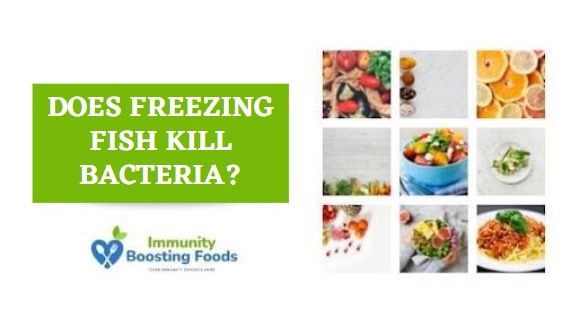If you are thinking about whether freezing kills bacteria in fish, then this article is for you. I’ll share with you some information about freezing fish that you may be interested in.
So does freezing fish kill bacteria? The answer to this question is no, it doesn’t.
Freezing fish kills some bacteria, but it doesn’t kill all of them. Some bacteria can survive freezing and even multiply when the fish is thawed.
According to the FDA (Federal Drug Administration), freezing does kill all bacteria but will also reduce their numbers and make bacteria inactive. The good news here is that even if you do not freeze your food before storing, there are other ways such as cooking foods thoroughly and keeping cooked meats separate from ready-made meals.
Freezing kills most pathogens but not all. Freezing will not kill tapeworms.
Freezing keeps your fish from spoiling
Freezing kills some bacteria and parasites. However, freezing does not prevent the growth of bacteria and parasites that can cause foodborne illness. Freezing also preserves the quality and texture of seafood.
Does freezing kill some parasites or bacteria in fish?
Freezing kills some bacteria. But it doesn’t work well in home freezers. They do not go down to -0 degrees Fahrenheit.
Frozen fish is easy to store and cook. Fish doesn’t need to be cooked right away, but it does need to be thawed out first. You can freeze fish without worrying about bacteria growing inside your fish.
Does Freezing Old Fish Make It Safe to Eat?
Frozen fish is safe to eat. However, frozen fish should not be consumed until thawed out completely.
Frozen fish should be kept frozen until ready to eat. Check the label to see if it was properly handled to avoid bacterial growth and spoilage.
How do you kill bacteria in raw fish?
You need to remove as much blood as possible from the raw fish before cooking it. Scales should be removed. Nitrates feed bacteria, so you want to get rid of them.
Fish should be frozen for several hours before being cleaned. You need to clean your hands with soap and water before cutting up the fish. Make sure there is plenty of water inside the fish when cooking or else the fish will dry out.
Cook the fish at high heat until it reaches 60 degrees Celsius.
Can you get salmonella from fish?
Yes, you can get salmonella from fish. Salmonella is a type of bacteria that can contaminate food, including fish. It is most commonly found in raw or undercooked meat, poultry, eggs, and dairy products. However, it can also be found in fish, especially if the fish has been contaminated with fecal matter from infected animals.
Here are some places where you can search further about whether freezing can cause bacteria:
- Scientific journals such as the Journal of Food Protection, Applied and Environmental Microbiology, and Food Microbiology publish research on the effects of freezing on bacteria.
- Academic websites such as the University of California, Davis Food Safety website and the University of Minnesota Extension Food Safety website provide information on food safety for consumers.



